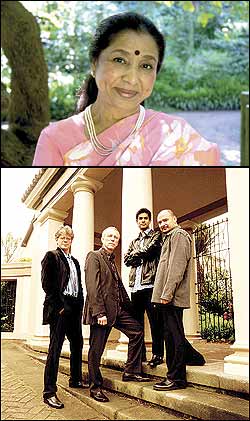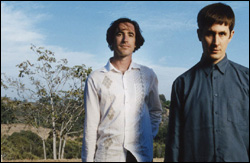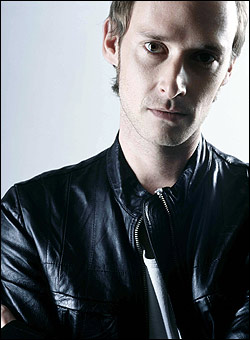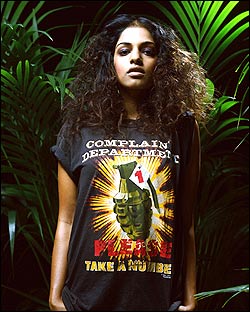Bollywood—India’s massive film industry, based in Mumbai—is all about over-the-top drama, kitsch, cheesy clichés, and boundless exuberance. Hollywood, for all its storied glitz and glamour, literally pales in comparison. Bollywood movies are less like regular movies and more like long, elaborately choreographed musicals, dripping in bright, oversaturated colors and even more oversaturated emotional content. Relentlessly chipper song-and-dance numbers—usually filmed somewhere lush and surreal, like the Swiss Alps in summertime—collide with overwrought story lines involving Romeo and Juliet–style romance and tragic family conflicts. The actors and actresses lip-synch, often in a hilariously obvious manner, leaving the tunes to a small coterie of playback singers.
One of the most famous of these playback singers is Asha Bhosle. Her syrupy-sweet soprano voice has backed thousands of Bollywood films over the years. As prolific and well-known as Bhosle is, though, she’s often overshadowed by her legendary older sister, “Nightingale of India” Lata Mangeshkar, a frequent presence in the Guinness Book of World Records for most songs recorded by a single person. But Bhosle had an edge—she was married to the late R.D. Burman, one of the most famous Bollywood composers of all time, and the two were a fearsome team.
You can find literally hundreds of Asha Bhosle CDs and LPs if you dig around enough. But now there’s one more to add to the pile—an odd one-off collaboration with arty Americans the Kronos Quartet. Over the past few decades, the seasoned string quartet has collaborated with the likes of Philip Glass and Steve Reich, and reinterpreted songs by Jimi Hendrix and other pop icons. You’ve Stolen My Heart: Songs From R.D. Burman’s Bollywood (Nonesuch) is odd not because it sounds too avant-garde or crazy, or even just a little weird. It’s odd because it’s so understated and tasteful—and Bollywood is anything but. Classic old Burman-penned themes, newly sung by Bhosle with backing from Kronos, seem airbrushed, power-washed, and blow-dried. It all sounds good at low volume, and would probably be perfect background music for a Starbucks near you.
Not that this is necessarily a bad thing. Bhosle’s voice, liberated from scratchy vinyl and half-forgotten 35 mm film reels from the ’70s, is captivating and radiant. It’s a testament to the agelessness of Bhosle’s voice that, though she’s in her 70s now, she still sounds about 25 years old. Impeccable percussion is provided by tabla master Zakir Hussain, and Kronos faithfully and painstakingly attempt to reproduce Burman’s original arrangements. Though Burman’s hummable compositions generally stayed within a poppy, melodic framework, he liberally folded in influences from everything from cancan to Gypsy music, making his music endlessly beguiling. Where exactly was that chirpy, twittering sound effect coming from? How did Burman make those swirling strings sound so transporting?
The problem is that Kronos think too hard about these questions, and you can hear their grinding hours of labor in the end result. Burman undoubtedly thought about these questions too much, too, but he made it all sound effortless—the kind of pop music that feels perfect because it sounds like it was slapped together in seconds. The traditional, unmistakably Indian instruments used by Burman, the santoor and sarod, are replaced here by Chinese musician and Kronos collaborator Wu Man’s fretted lute. It doesn’t sound quite right—it sounds thinner and more brittle—which makes Burman’s original, rich, flashy, fleshy music feel even more restrained. When Bollywood got elevated to High Art, something got lost in translation.







